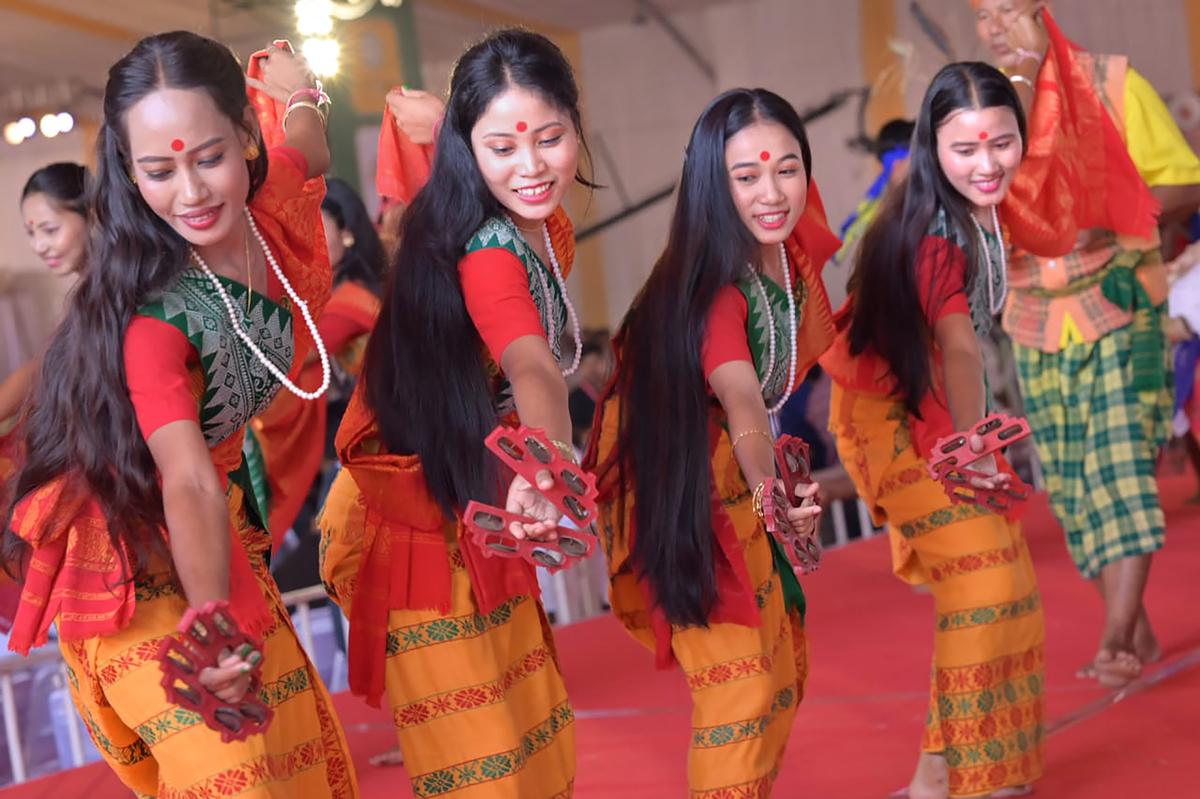World’s rhythms, a delectable India at Chhattisgarh’s National Tribal Dance Festival
Artists from across the world take part in the event in Chhattisgarh showcasing their talent and getting a glimpse of diverse Indian culture
Artists from across the world take part in the event in Chhattisgarh showcasing their talent and getting a glimpse of diverse Indian culture
From what looks like an elaborate spread served to this bunch of teenagers from north Sumatra, they pick chapatti — the humble Indian flatbread — as their favourite. For all the similarities between Indian and Indonesian cuisine, wheat is a rarity back home, and they would like to indulge in this local staple in the limited window on offer, they say.
Seated a few tables away are Marco Pandelich (25) and his troupe from Serbia. For this group — all members of the Talija Art Company who have been performing together for the past 20 years and have travelled across the globe — the standout part about India is the sheer number of people who turned out to watch their dance performance here.

Tribal artists perform during the National Tribal Dance Festival, in Raipur, on November 1, 2022.
| Photo Credit: PTI
They were among the representatives from 10 countries sharing their experiences in India while they had converged in Raipur for the National Tribal Dance Festival. The third edition of the three-day event that the Chhattisgarh government claims is one of its kind anywhere in the world, concluded on Thursday.
While teams from all over the country competed in the festival, the international contingent, comprising artists from Mozambique, Mongolia, Togo, Russia, Indonesia, Maldives, Serbia, New Zealand, Rwanda and Egypt, were invited to add an international flavour to an event, that Chhattisgarh Chief Minister Bhupesh Baghel said, was aimed at uniting the world for the rights of tribals.
Enriching experience
While the crowd enjoyed their performances, the dance troupes also described the experience as enriching, getting a glimpse of diverse Indian culture as well as fellow international participants.
Shahira Nafisha, a 15-year-old from Indonesia, said her group was formed combining students from different schools in her region and they had been practising for a month to improve coordination. Their group leader Dewi Marlina Marv who has been to India before, said that on their way to Raipur, the troupe’s members had many questions about the country. “They asked me questions like ‘Is dance mandatory for girls in India’ or ‘what are the various dance forms they have’ or ‘how is the food there’. I was pleased to share whatever I knew.
Language was a barrier for many contingents, such as the ones from Indonesia and Mongolia, but using a handy mix of interpreters and modern tools such as Google Translate, they managed their interactions with media and others. For those like Olivier Agbemedji (29) from Togo, the school system of the former French colony that “teaches seven languages, four of them European”, life as a globetrotter becomes much easier.
Hindi film numbers
One aspect of India that most from this cross-section is familiar with is Bollywood and marquee names such as Shah Rukh Khan and Kajol. Some obliged to media requests and flawlessly sang a couple of Hindi film numbers while gleefully admitting that they do not have much knowledge about the language, and it was mostly by rehearsing and repeat watches that they were able to pull off the show.
A combination of spot training and repeated requests from the organisers, they had a new catchphrase, a Chhattisgarhi one, in their repertoire. During their media interactions, most were signing off with “ Chhattisgarhiya Sable Badhiya [Chhattisgarhis are the best]”.
Reconnect with roots
As many as 1,500 artists performed with Chhattisgarh and Sikkim bagging the top prizes in the competitive categories. For some, the event was also an opportunity to have a brief reconnect with roots. Dr. Satendra Singh, a fifth generation Indian living in New Zealand who had come with the New Zealand indigenous cultural team, said Indian people had very close relations with Maori people and they even marry with each other.
A similar “homecoming” was the sideshow for Luciana Toppo and Teresa Toppo, members of a troupe from Assam performing Kurukh Karam dance. Most of the members of the group have their roots in the tribal-dominated areas of what is now northern Chhattisgarh. From there, their forefathers were taken to work in the tea gardens of Assam by the British four generations ago. “It’s great to reconnect and I really liked the local culture here as well. I would like to come back again,” said Teresa, a college student.
For all the latest Entertainment News Click Here
For the latest news and updates, follow us on Google News.
